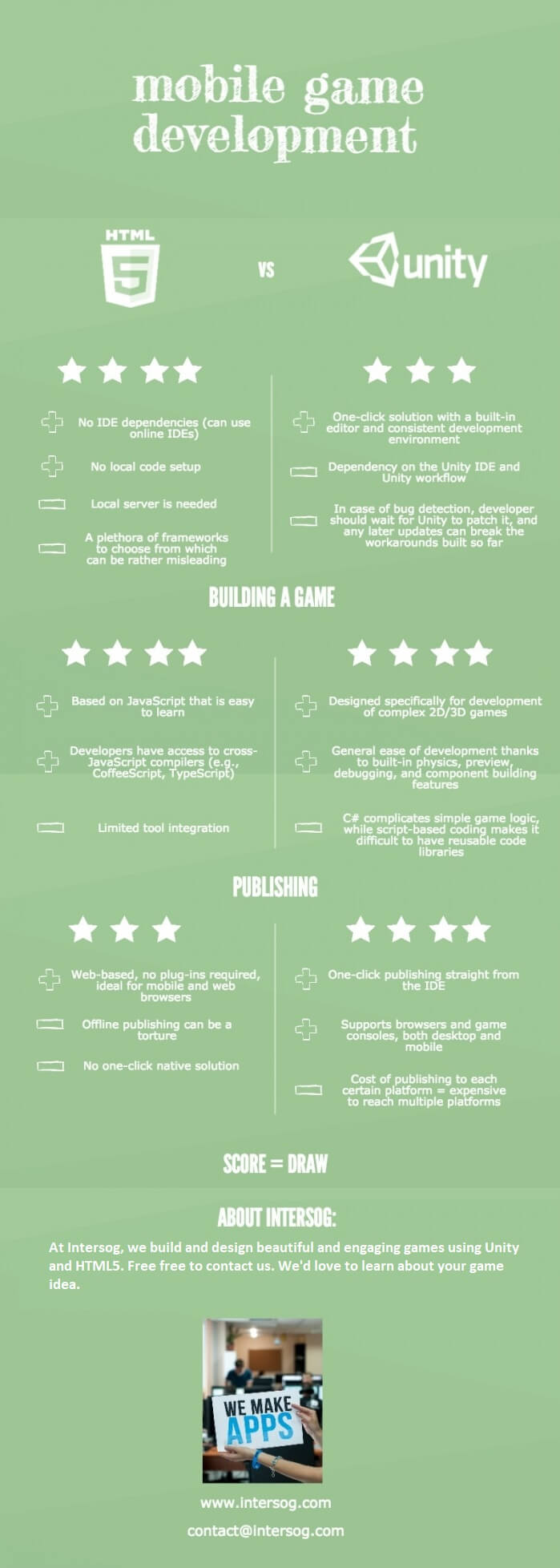Each game developer company should find the tool best for their unique app development project and overall business needs. A lot of factors should be considered before making the final decision regarding the game development platform or technology.
Among them are target mobile platforms, game complexity, desired timeframes, ease of publishing, access to frameworks and compilers, web and mobile browser support, and many more.
During his recent Develop Live Talk, gaming evangelist Jesse Freeman compared the pros and cons of developing HTML5 games versus Unity-based games across the three aspects: setup, game development, and game publishing.
Unity versus HTML5 Infographic
And what do you think about Freeman's judgements?
Did he miss anything in his evaluation of HTML5 vs. Unity game development?
1. Setup
Unity is a cross-platform game development tool that allows you to create 2D and 3D games across various platforms (Windows, Mac, iOS, Android, Playstation, etc.) using C# (c-shart) programming.
Unity's free version allows you to use the Unity Editor, a full-scale version of your computer's typical game development environment. With the Editor, you can add and use 2D assets such as sprites, fonts, and animations.
Also, Unity's free version doesn't allow you to upload your games to the web. However, consider using Unity Web Player with Unity's subscription version if you're developing and publishing a mobile game.
In the HTML5 game development environment, you don't need to download any third-party software to get started. All mobile platforms, such as Android and iOS, well support HTML5 and CSS3.
To get started with any HTML5 game, you'll need a code editor, such as Brackets or Sublime Text. Then, to create an HTML5/CSS3 game that runs in mobile and desktop browsers, you'll need to use a compiler.
2. Game Development
Unity is a powerful game development tool with many features, such as the Unity Asset Store and the Scripting API.
You'll have to use Unity's scripting API if you need to add complex logic to your game or want it to participate in a real-time multiplayer mode. As for the Unity Asset Store, it's a repository of free and paid-for assets that you can use to add more features to your mobile or web game.
HTML5 game development has come a long way since its initial release in 2008. HTML5-based games can be played in mobile and desktop browsers using JavaScript. In addition, there are some frameworks that you can use to make game development easier. These include Impact and PixiJS.
3. Game Publishing
Once your game is ready, you want to publish it and let the world play it.
In Unity, your game can be published as a standalone mobile app for iOS and Android devices (as well as Windows, Mac, PC, and other platforms). You can upload your final build to the app store or market for each platform.
HTML5 game publishing is less challenging than Unity. For example, you can publish your game to the web using a simple <script> tag in the HTML document.
The pros and cons of both technologies should be taken into consideration. You can use the above-mentioned infographic to compare HTML5 and Unity.










